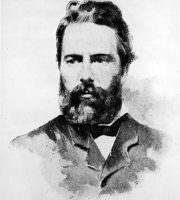by Herman Melville
At breakfast in refectory there
The priest — if Clarel not mistook —
The good priest wore the troubled air
Of honest heart striving to brook
Injury, which from words abstained,
And, hence, not readily arraigned;
Which to requite in its own sort
Is not allowed in heaven's high court,
Or self-respect's. Such would forget,
But for the teasing doubt or fret,
Lest unto worldly witness mere
The injury none the less appear
To challenge notice at the least.
Ungar withdrew, leaving the priest
Less ill at ease; who now a thought
Threw out, as 'twere in sad concern
For one whose nature, sour or stern,
Still dealt in all unhandsome flings
At happy times and happy things:
" " The bramble sayeth it is naught " :
Poor man!" But that; and quite forbore
To vent his grievance. Nor less sore
He felt it — Clarel so inferred,
Recalling here too Mortmain's word
Of cutting censorship. How then?
While most who met him frank averred
That Derwent ranked with best of men,
The Swede and refugee unite
In one repugnance, yea, and slight.
Now take, construe their ill-content?
A thing of vein and temperament?
Rolfe liked him; and if Vine said naught,
Yet even Vine seemed not uncheered
By fair address. Then stole the thought
Of how the priest had late appeared
In that one confidential hour,
Ambiguous on Saba's tower.
There he dismissed it, let it fall:
To probe overmuch seems finical.
Nor less (for still the point did tease,
Nor would away and leave at ease)
Nor less, I wonder, if ere long
He 'll turn this off, not worth a song,
As lightly as of late he turned
Poor Mortmain's sally when he burned?
Last updated March 26, 2023




